
The Heartbeat of Yogyakarta: Malioboro
Malioboro is the vibrant epicenter of Yogyakarta, Indonesia, where the city's rich culture, history, and modern life collide. This bustling street is a sensory feast, offering a unique blend of traditional Javanese culture and contemporary attractions. Stroll along Malioboro Street, and you'll be greeted by a lively array of street vendors, selling everything from batik clothing to local snacks. The air is filled with the enticing aroma of Indonesian street food, and the sounds of street musicians playing traditional gamelan music. It's a place where you can truly immerse yourself in the local way of life. Historical landmarks are also abundant in Malioboro. The iconic Tugu Yogyakarta monument stands proudly at one end of the street, serving as a symbol of the city's resilience and spirit. The nearby Sultan's Palace, or Kraton, offers a glimpse into the regal past of Yogyakarta, with its beautiful architecture and cultural performances. Malioboro is not just about history and culture; it's also a shopping paradise. The Malioboro Mall and numerous local boutiques offer a wide range of goods, from traditional crafts to modern fashion. Whether you're looking for souvenirs or just want to indulge in some retail therapy, Malioboro has something for everyone.
Local tips in Malioboro
- Visit early in the morning or late in the evening to avoid the crowds and heat.
- Bargaining is common practice at street stalls, so don't hesitate to negotiate prices.
- Try local delicacies like gudeg, a traditional Javanese dish made from young jackfruit.
- Wear comfortable shoes, as you'll be doing a lot of walking along the busy street.
The Heartbeat of Yogyakarta: Malioboro
Malioboro is the vibrant epicenter of Yogyakarta, Indonesia, where the city's rich culture, history, and modern life collide. This bustling street is a sensory feast, offering a unique blend of traditional Javanese culture and contemporary attractions. Stroll along Malioboro Street, and you'll be greeted by a lively array of street vendors, selling everything from batik clothing to local snacks. The air is filled with the enticing aroma of Indonesian street food, and the sounds of street musicians playing traditional gamelan music. It's a place where you can truly immerse yourself in the local way of life. Historical landmarks are also abundant in Malioboro. The iconic Tugu Yogyakarta monument stands proudly at one end of the street, serving as a symbol of the city's resilience and spirit. The nearby Sultan's Palace, or Kraton, offers a glimpse into the regal past of Yogyakarta, with its beautiful architecture and cultural performances. Malioboro is not just about history and culture; it's also a shopping paradise. The Malioboro Mall and numerous local boutiques offer a wide range of goods, from traditional crafts to modern fashion. Whether you're looking for souvenirs or just want to indulge in some retail therapy, Malioboro has something for everyone.
Iconic landmarks you can’t miss
Malioboro Yogyakarta
Explore the vibrant culture and shopping delights of Malioboro, Yogyakarta's iconic street, where tradition meets modernity in a lively atmosphere.
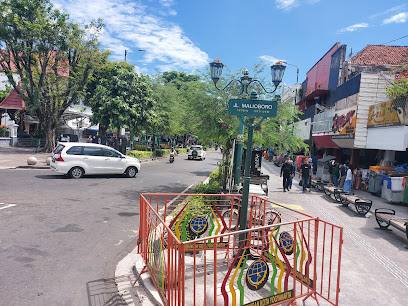
Yogyakarta Monument
Discover the Yogyakarta Monument, a historical landmark that encapsulates the rich heritage and culture of Yogyakarta, Indonesia.
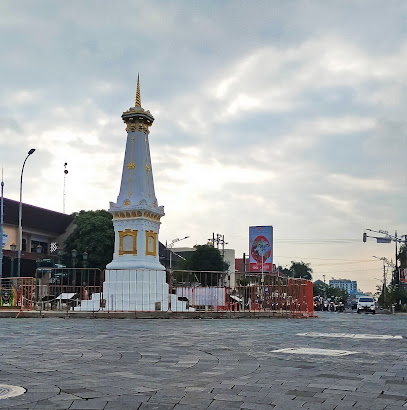
Vredeburg Museum
Discover the rich cultural heritage of Indonesia at Vredeburg Museum, a historical fortress turned museum in the heart of Yogyakarta.
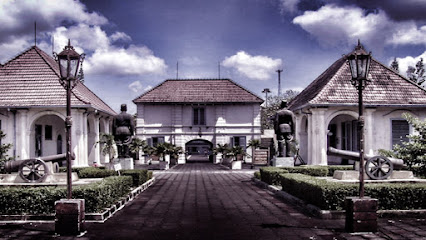
Tourism Zone Malioboro
Discover the vibrant cultural heart of Yogyakarta at Tourism Zone Malioboro, where shopping, delicious food, and rich heritage come together.
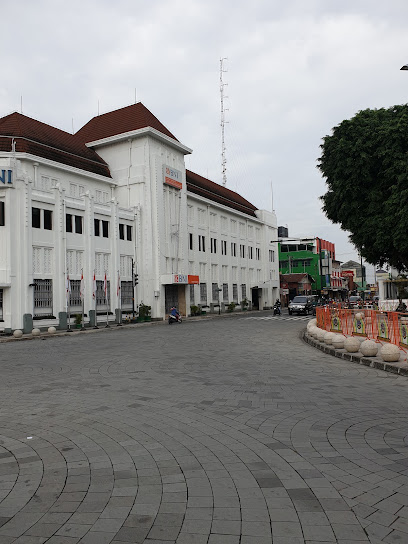
Rumah Hantu Malioboro
Discover the spine-chilling tales of Indonesia at Rumah Hantu Malioboro, a unique haunted house experience in Yogyakarta's vibrant cultural heart.
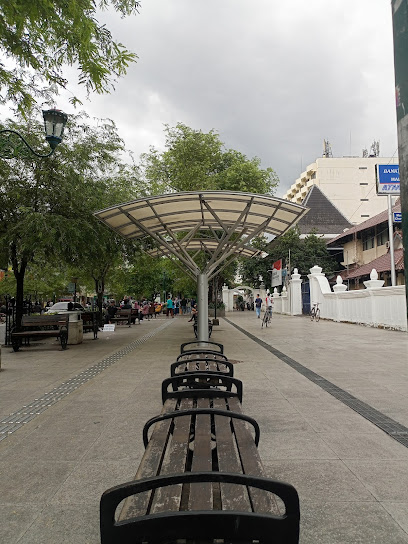
Plang Malioboro
Experience the vibrant culture and rich history of Yogyakarta at Plang Malioboro, a must-visit historical landmark with shopping, dining, and entertainment.
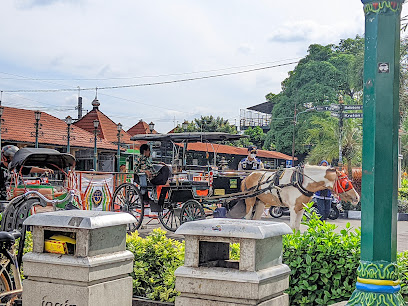
Ndalem Jogonegaran
Experience the elegance of Javanese heritage at Ndalem Jogonegaran, a remarkable historical landmark in Yogyakarta, Indonesia.
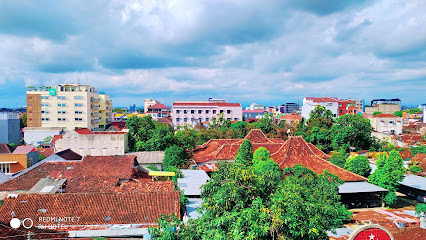
Malioboro Yogyakarta Indonesia
Discover Malioboro, Yogyakarta's vibrant street market offering a unique blend of culture, shopping, and delectable street food in the heart of Indonesia.
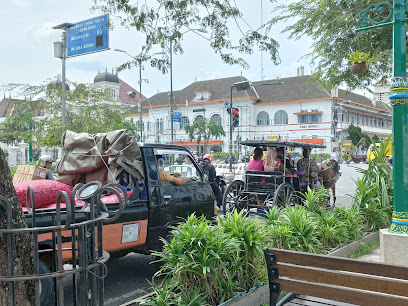
Monumen Ngejaman Malioboro
Explore the rich heritage of Yogyakarta at Monumen Ngejaman Malioboro, a serene historical landmark reflecting Indonesia's vibrant culture.
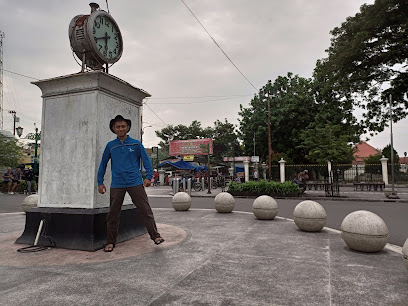
Tetenger Yogya Kembali
Explore the rich history of Tetenger Yogya Kembali, a landmark that symbolizes the spirit of independence in Yogyakarta, Indonesia.
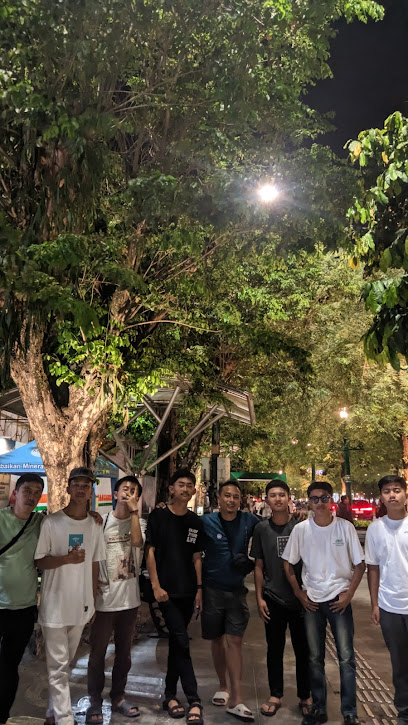
Unmissable attractions to see
Malioboro Yogyakarta
Discover the vibrant heart of Yogyakarta at Malioboro, a bustling street filled with shopping, culture, and delicious local cuisine.
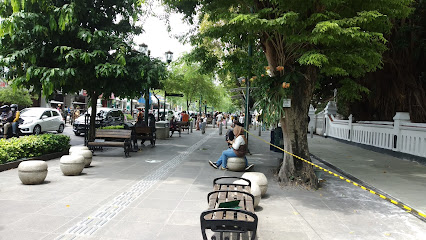
Yogyakarta Monument
Discover the historical Yogyakarta Monument, a captivating symbol of Indonesia's rich cultural heritage and a must-visit landmark for tourists.
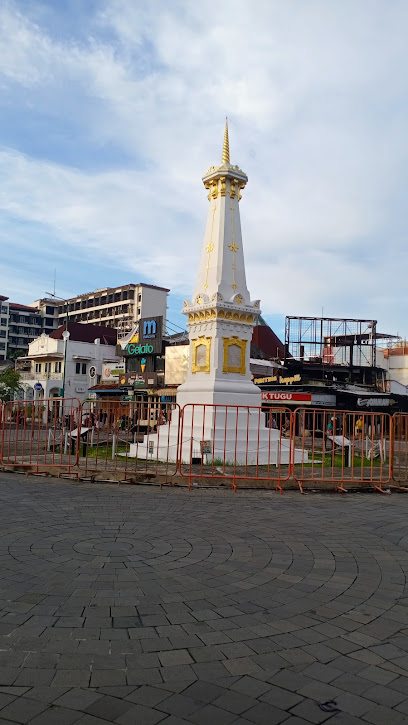
Taman Sari
Explore Taman Sari, the enchanting water castle of Yogyakarta, where history, culture, and breathtaking architecture await every traveler.
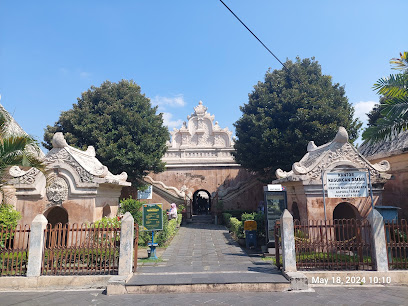
Keraton Ngayogyakarta Hadiningrat
Explore the rich cultural heritage of Yogyakarta at Keraton Ngayogyakarta Hadiningrat, the royal palace of Javanese tradition, history, and artistry.
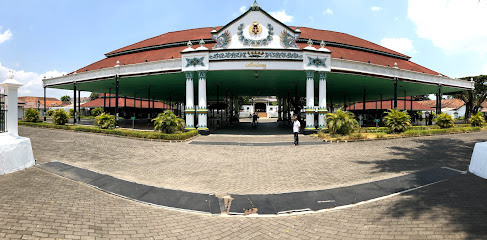
Taman Pintar Yogyakarta
Explore Taman Pintar Yogyakarta, where science and fun collide in an interactive playground of knowledge and discovery.
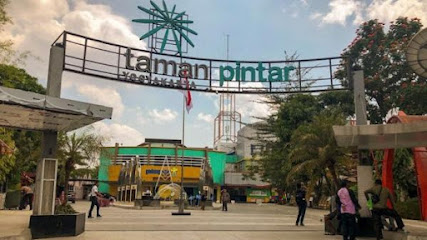
Museum Sonobudoyo Unit I
Discover the rich cultural heritage of Java at Museum Sonobudoyo, an art museum showcasing captivating artifacts and traditional performances in Yogyakarta.
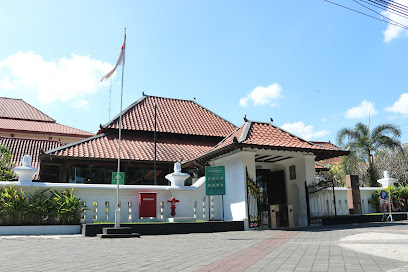
Yogyakarta Northern Square
Experience the vibrant local culture and beautiful landscapes at Yogyakarta Northern Square, a must-visit park in the heart of Yogyakarta.
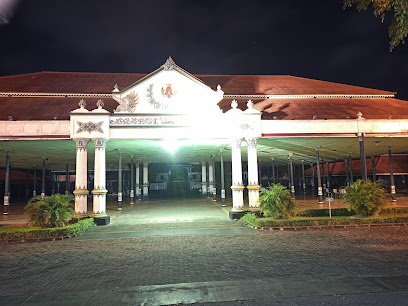
Tourism Zone Malioboro
Discover the vibrant essence of Yogyakarta at Malioboro, a bustling street filled with culture, shopping, and delicious local cuisine.
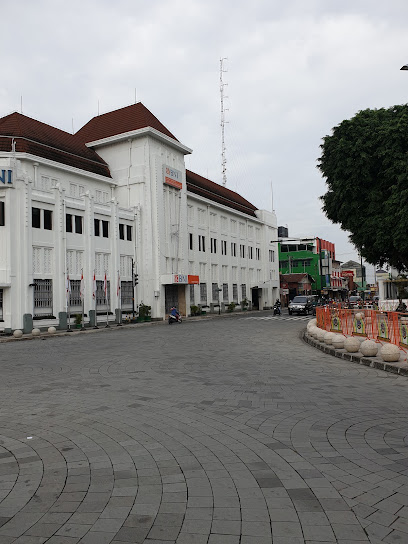
Pasar Sore Malioboro
Experience the vibrant atmosphere of Pasar Sore Malioboro, a flea market in Yogyakarta filled with handicrafts, street food, and local culture.
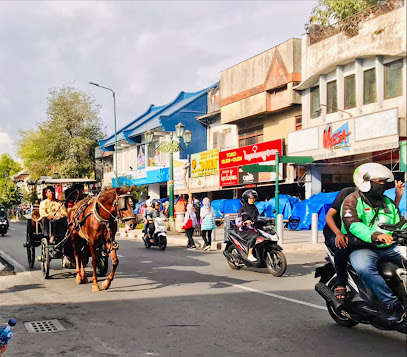
1 March 1949 Monument
Explore the 1 March 1949 Monument in Yogyakarta, a historical landmark celebrating Indonesia's independence with stunning architecture and serene surroundings.
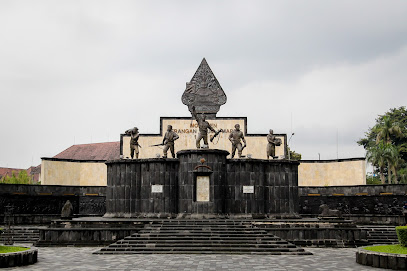
Rumah Hantu Malioboro
Experience the thrill of the supernatural at Rumah Hantu Malioboro, Yogyakarta's premier haunted house attraction showcasing local folklore and ghost stories.
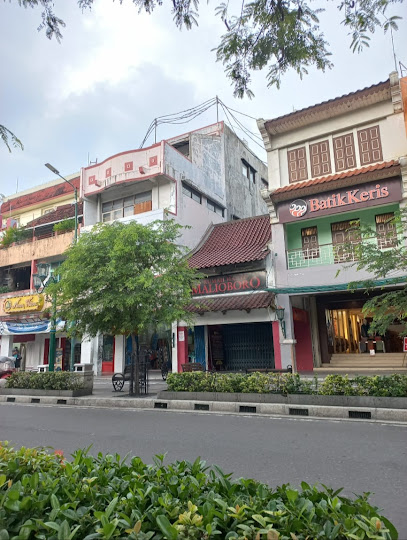
Kraton Jogja
Explore the historic Kraton Jogja, a royal palace and cultural museum that showcases the exquisite heritage and traditions of Yogyakarta.
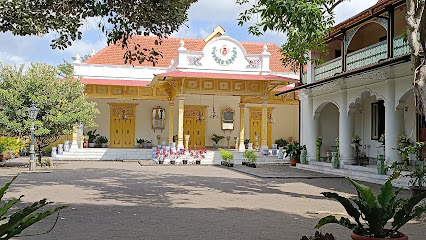
Slasar Malioboro
Experience the vibrant culture, shopping, and culinary delights at Slasar Malioboro, the heart of Yogyakarta's bustling atmosphere.
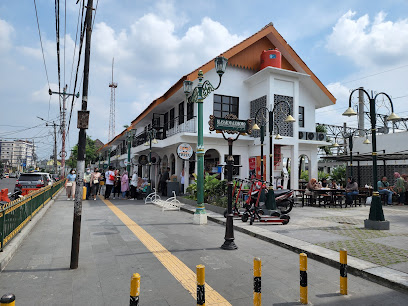
Malioboro Yogyakarta Indonesia
Discover the vibrant culture, delicious street food, and unique handicrafts along Malioboro Street in Yogyakarta, Indonesia.
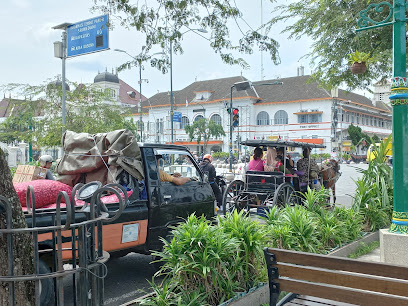
MALIOBORO JOGJA
Discover the vibrant culture, shopping, and street food of Malioboro, the heart of Yogyakarta, where tradition meets modernity.
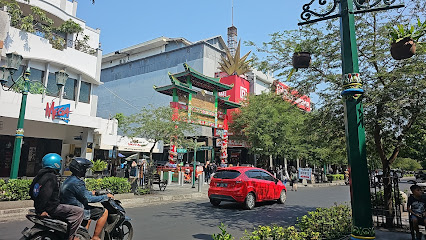
Essential places to dine
Bedhot Resto
Experience authentic Indonesian cuisine at Bedhot Resto in Yogyakarta - where every meal tells a story.
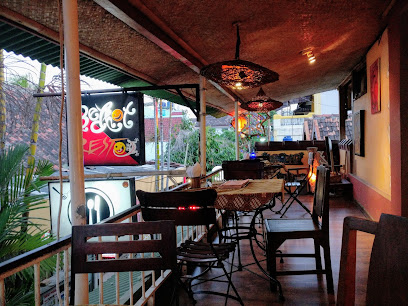
Malioboro Food Court
Discover Yogyakarta's culinary treasures at Malioboro Food Court—where local flavors meet international cuisine in a vibrant setting.
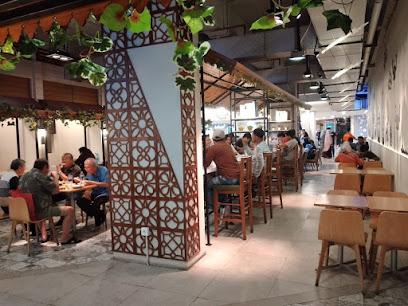
Kala Jumpa
Discover authentic Indonesian cuisine with a modern twist at Kala Jumpa, Yogyakarta's culinary treasure.
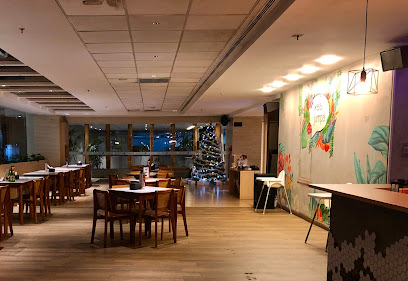
Arroy Mak Mak
Experience authentic Thai cuisine at Arroy Mak Mak in Yogyakarta's Mall Malioboro, where every dish tells a story of flavor and tradition.
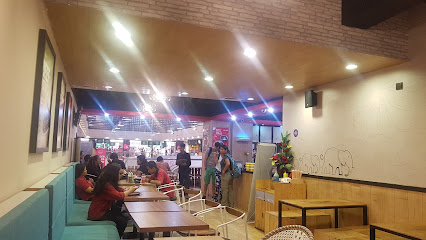
Platinum Grill
Indulge in delectable cuisine at Platinum Grill - where local flavors meet modern elegance in the heart of Yogyakarta.
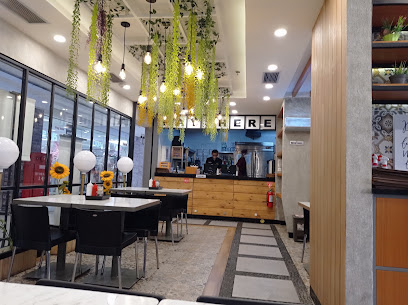
Shinta Restaurant
Experience the authentic taste of Indonesian cuisine at Shinta Restaurant in Yogyakarta - perfect for families and food lovers alike.
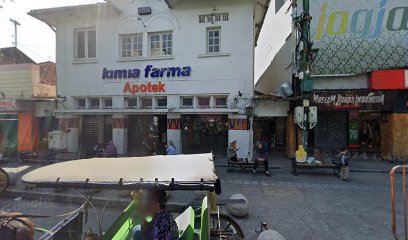
La Table Restaurant
Discover the flavors of Indonesia at La Table Restaurant in Yogyakarta, where local delicacies meet international culinary excellence.
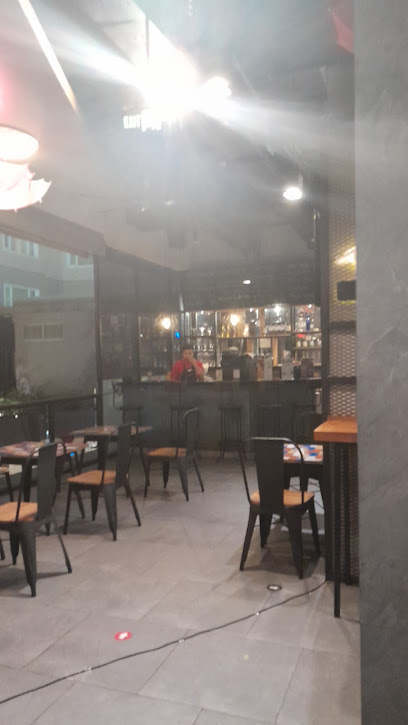
Ayu Yuniar
Discover authentic Indonesian cuisine at Ayu Yuniar in the heart of Yogyakarta's bustling Mall Malioboro.
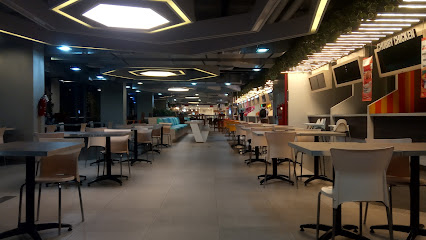
Lumpya Jago Malioboro
Experience the essence of Indonesia at Lumpya Jago Malioboro - where authentic flavors meet unforgettable dining.
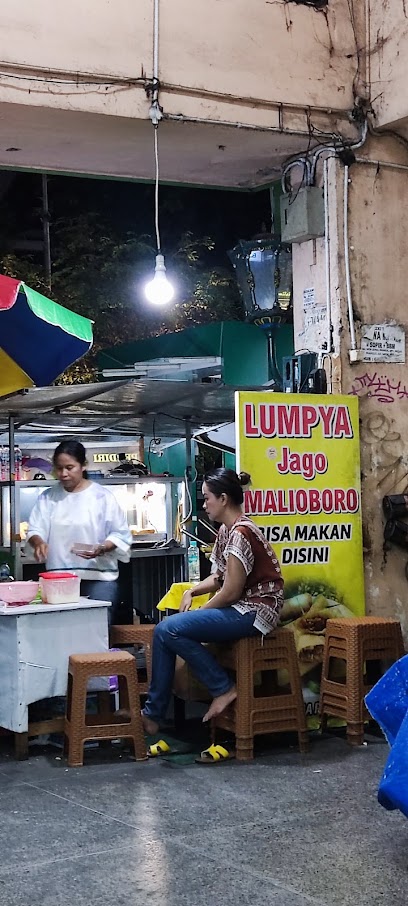
Food Court Teras Malioboro 1
Discover authentic Indonesian cuisine at Food Court Teras Malioboro 1 – where vibrant culture meets delectable flavors in Yogyakarta.

Markets, malls and hidden boutiques
Malioboro Mall
Explore Malioboro Mall: A Shopping Haven in Yogyakarta with a Blend of Local Culture and Modern Retail Experiences.

Matahari Department Store Plaza Malioboro
Discover the ultimate shopping experience at Matahari Department Store Plaza Malioboro, where fashion meets convenience in Yogyakarta.
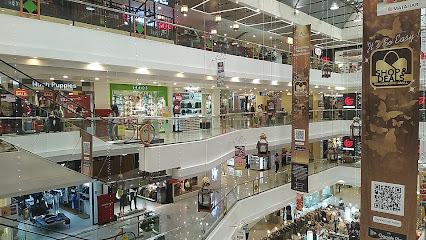
OVJ Mall
Explore the vibrant fashion scene at OVJ Mall, where local culture meets contemporary style in the heart of Yogyakarta.
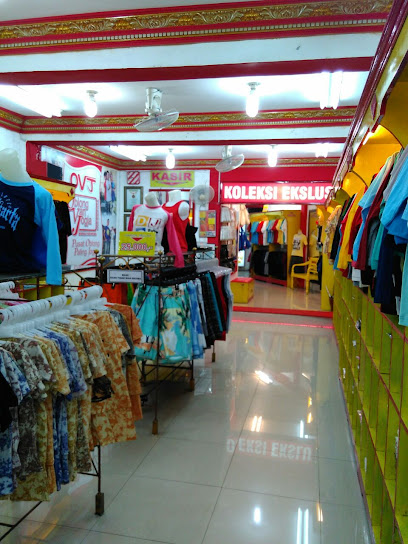
Polo
Explore Polo in Yogyakarta for an upscale shopping experience featuring stylish clothing and exceptional customer service in Malioboro Mall.
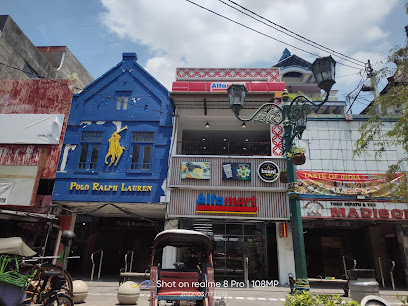
Malio Ave Malioboro Plaza
Explore the heart of Yogyakarta's fashion scene at Malio Ave Malioboro Plaza, where vibrant styles and local culture come together.

Levi's Mal Malioboro
Explore the fashion-forward offerings at Levi's Mal Malioboro, the ultimate boutique destination in Yogyakarta for stylish denim and apparel.
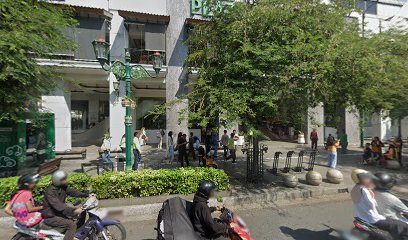
Merché Plaza Malioboro
Discover the vibrant shopping experience at Merché Plaza Malioboro in Yogyakarta, a blend of local craftsmanship and international brands.
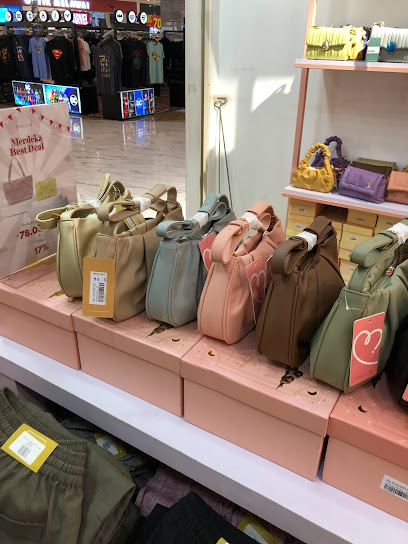
Bintoro Art Shop
Explore Bintoro Art Shop in Yogyakarta for authentic Indonesian souvenirs and handcrafted treasures that reflect the rich cultural heritage of the region.
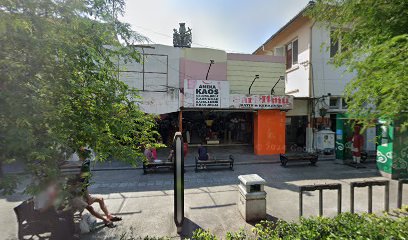
Minimal
Discover unique fashion at Minimal Clothing Store in Yogyakarta's Mall Malioboro, where modern style meets local culture.
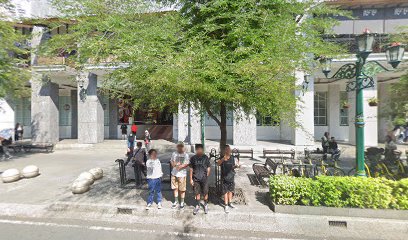
Versace
Discover luxurious Western apparel at Versace Yogyakarta, where elegance meets high fashion in the heart of Malioboro Mall.
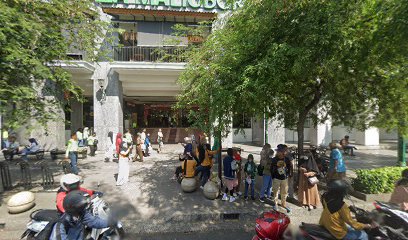
Essential bars & hidden hideouts
Lucifer
Discover the vibrant nightlife at Lucifer Bar, a hotspot for beer lovers in Yogyakarta, offering a cozy atmosphere and extensive drink selection.
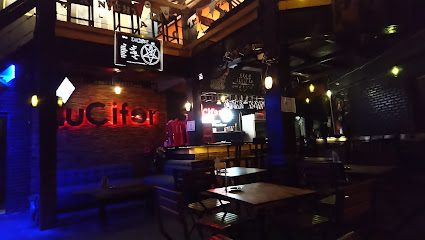
D' Skybar @ ibis Styles Yogyakarta
Experience breathtaking views and delightful flavors at D' Skybar, the premier rooftop destination in Yogyakarta, where every sunset is a celebration.
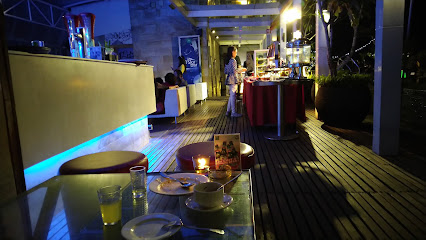
BLACKDOOR Lounge & KTV
Experience unforgettable nights at BLACKDOOR Lounge & KTV, Yogyakarta's hotspot for karaoke and relaxation in a stylish setting.
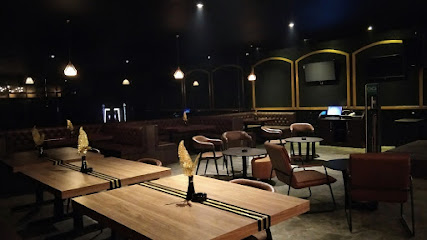
Neo Sky Lounge
Discover the ultimate rooftop escape at Neo Sky Lounge, where breathtaking views and exquisite drinks create unforgettable memories in Yogyakarta.
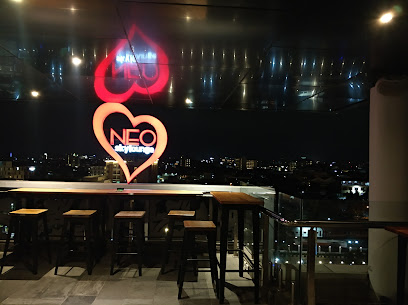
Lotus Sky Lounge Dafam Fortuna Malioboro
Experience tranquility at Lotus Sky Lounge in Yogyakarta - where breathtaking views and refreshing drinks meet the vibrant spirit of Indonesia.
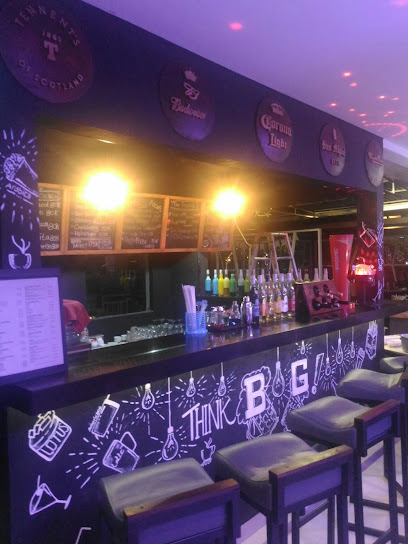
ANDORRA Restaurant & Bar
Experience the vibrant culinary scene of Yogyakarta at ANDORRA Restaurant & Bar, where local flavors meet a cozy atmosphere.
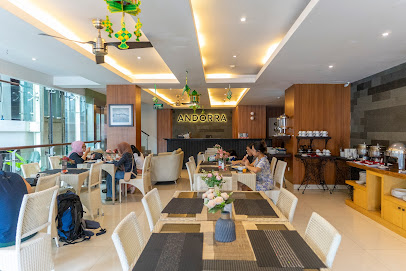
10/10 Pool Bar Rooftop
Experience breathtaking views and vibrant nightlife at Yogyakarta's premier rooftop bar, 10/10 Pool Bar Rooftop, situated atop Novotel Suites.
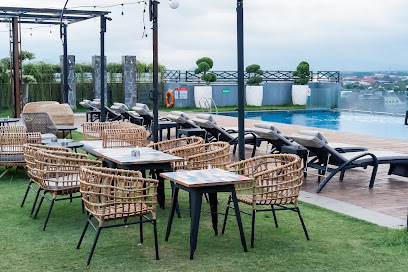
Ibar Malioboro
Experience the vibrant nightlife and delightful flavors of Ibar Malioboro, a top bar and restaurant in the heart of Yogyakarta.
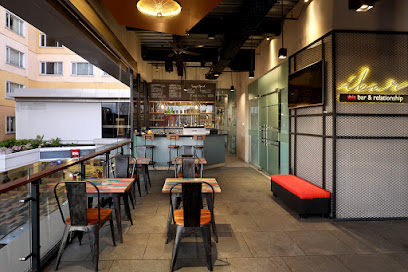
ok
Experience Yogyakarta's nightlife at this vibrant bar, offering a unique blend of local drinks and live music in a lively atmosphere.
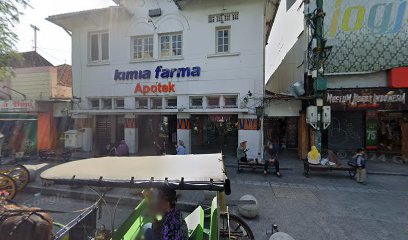
Cedow Netral
Discover the vibrant nightlife of Yogyakarta at Cedow Netral, a bar offering a unique blend of local culture and refreshing drinks.
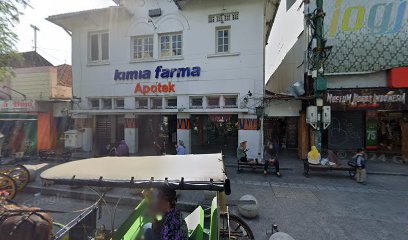
Local Phrases
-
- HelloHalo
[hah-loh] - GoodbyeSelamat tinggal
[suh-lah-maht ting-gahl] - YesYa
[yah] - NoTidak
[tee-dahk] - Please/You're welcomeSilakan
[see-lah-kahn] - Thank youTerima kasih
[teh-ree-mah kah-see] - Excuse me/SorryMaaf
[mah-ahf] - How are you?Apa kabar?
[ah-pah kah-bar] - Fine. And you?Baik. Dan kamu?
[bah-eek dahn kah-moo] - Do you speak English?Apa kamu bisa berbahasa Inggris?
[ah-pah kah-moo bee-sah buhr-bah-hah ee-ng-grees] - I don't understandSaya tidak mengerti
[sah-yah tee-dahk muhng-ehr-tee]
- HelloHalo
-
- I'd like to see the menu, pleaseSaya ingin melihat menu, tolong
[sah-yah een-geen muh-lee-haht meh-noo toh-long] - I don't eat meatSaya tidak makan daging
[sah-yah tee-dahk mah-kahn dah-yahng] - Cheers!Selamat minum!
[suh-lah-maht mee-noom] - I would like to pay, pleaseSaya ingin membayar, tolong
[sah-yah een-geen muhm-bah-yahr toh-long]
- I'd like to see the menu, pleaseSaya ingin melihat menu, tolong
-
- Help!Tolong!
[toh-long] - Go away!Pergi!
[pehr-gee] - Call the Police!Panggil polisi!
[pahng-geel poh-lee-see] - Call a doctor!Panggil dokter!
[pahng-geel dohk-tehr] - I'm lostSaya tersesat
[sah-yah tuhr-suh-saht] - I'm illSaya sakit
[sah-yah sah-keet]
- Help!Tolong!
-
- I'd like to buy...Saya ingin membeli...
[sah-yah een-geen muhm-buh-lee] - I'm just lookingSaya hanya melihat-lihat
[sah-yah hahn-yah muh-lee-haht-lee-haht] - How much is it?Berapa harganya?
[buh-rah-pah hahr-gahn-yah] - That's too expensiveItu terlalu mahal
[ee-too teh-rah-lah mah-hahl] - Can you lower the price?Bisa kurangi harganya?
[bee-sah koo-rahn-gee hahr-gahn-yah]
- I'd like to buy...Saya ingin membeli...
-
- What time is it?Jam berapa sekarang?
[jahm buh-rah-pah suh-kah-rahng] - It's one o'clockJam satu
[jahm sah-too] - Half past (10)Setengah (sepuluh)
[seh-tehn-gah (suh-poo-loo)] - MorningPagi
[pah-gee] - AfternoonSiang
[syahng] - EveningSore
[soh-reh] - YesterdayKemarin
[kuh-mah-reen] - TodayHari ini
[hah-ree ee-nee] - TomorrowBesok
[beh-sohk] - 1Satu
[sah-too] - 2Dua
[doo-ah] - 3Tiga
[tee-gah] - 4Empat
[em-paht] - 5Lima
[lee-mah] - 6Enam
[eh-nahm] - 7Tujuh
[too-joo] - 8Delapan
[deh-lah-pahn] - 9Sembilan
[sem-bee-lahn] - 10Sepuluh
[suh-poo-loo]
- What time is it?Jam berapa sekarang?
-
- Where's a/the...?Dimana...
[dee-mah-nah] - What's the address?Alamatnya apa?
[ah-lah-maht-nyah ah-pah] - Can you show me (on the map)?Bisa tunjukkan ke saya (di peta)?
[bee-sah toon-jook-kahn keh sah-yah (dee peh-tah)] - When's the next (bus)?Kapan yang berikutnya (bus)?
[kah-pahn yahng buh-ree-koot-nyah (boos)] - A ticket (to ....)Satu tiket (ke ....)
[sah-too tee-keht (keh ....)]
- Where's a/the...?Dimana...
History of Malioboro
-
Malioboro's history is deeply intertwined with the colonial era of Indonesia. Established in the 18th century, it became a central hub for trade and commerce under Dutch colonial rule. The name 'Malioboro' is derived from the Sanskrit word 'Mali' (flower) and 'Boro' (road), symbolizing its role as a vibrant marketplace. The construction of Dutch administrative buildings along the street marked the beginning of its transformation into a bustling commercial center.
-
The establishment of the Sultanate of Yogyakarta in 1755 significantly influenced Malioboro's cultural landscape. As the seat of the sultanate, Malioboro became a focal point for Javanese culture, art, and tradition. The street is lined with traditional markets, artisan shops, and cultural landmarks, reflecting the rich heritage of the sultanate. Events such as the Grebeg ceremony, held annually, showcase the sultanate's traditions and attract both locals and tourists.
-
During the early 20th century, Malioboro became a site of political activism as the Indonesian nationalist movement gained momentum. Local leaders and activists organized gatherings and rallies along the street, advocating for independence from Dutch colonial rule. The area served as a gathering point for those advocating for national identity and resistance, playing a crucial role in shaping Indonesia's path toward independence.
-
Following Indonesia's independence in 1945, Malioboro underwent significant urban development. The street evolved into a vital commercial artery, with the establishment of modern shops, hotels, and entertainment venues. This transition marked a shift from traditional markets to a more contemporary urban landscape, while still preserving its historical charm. The continuous influx of tourists has solidified Malioboro's status as a must-visit destination in Yogyakarta.
-
In recent years, efforts to preserve Malioboro's cultural heritage have intensified amidst rapid modernization. The local government has implemented initiatives to maintain the area's traditional markets and promote local artisans. Events such as Malioboro Night Market, which showcases local cuisine and crafts, emphasize the importance of cultural preservation while catering to the growing tourist population. The balance between modernization and heritage is a defining theme of Malioboro's ongoing history.
Malioboro Essentials
-
Malioboro is centrally located in Yogyakarta and is easily accessible from other neighborhoods. From Yogyakarta's Adisutjipto International Airport, you can take a taxi or an airport shuttle service which takes around 30 minutes. Alternatively, if you are coming from the Tugu Railway Station, Malioboro is about a 10-minute walk or a short taxi ride away. Local buses (trans Jogja) also connect various parts of the city to Malioboro.
-
Malioboro is a pedestrian-friendly area, making it easy to explore on foot. For longer distances, you can use local transportation options such as 'ojek' (motorcycle taxis) or traditional 'becak' (pedicabs). Trans Jogja buses run frequently, connecting Malioboro with other parts of Yogyakarta. Bicycles can also be rented at various shops in the area for a leisurely ride.
-
Malioboro is generally safe for tourists; however, it is wise to remain cautious. Petty crimes, such as pickpocketing, can occur in crowded areas. Areas around the traditional markets may experience higher crime rates, particularly at night. Always keep your belongings secure and be aware of your surroundings, especially when using ATMs or handling cash.
-
In case of an emergency, dial 112 for police assistance or 118 for medical emergencies. There are several hospitals and clinics nearby, including RSU Dr. Sardjito and RSUP Dr. Soeradji Tirtonegoro. It is advisable to have travel insurance that covers medical emergencies. For minor health issues, pharmacies are available throughout Malioboro.
-
Fashion: Do dress modestly, especially when visiting temples and religious sites. Avoid wearing shorts and revealing clothing. Religion: Do respect local customs; always remove your shoes before entering temples. Public Transport: Do be polite and offer your seat to the elderly or pregnant women. Don't eat or drink in public transport. Greetings: Do greet locals with a friendly smile and a slight nod; handshakes are also common. Eating & Drinking: Do try local food and beverages, especially street food. Don't waste food or refuse offerings; it is considered impolite.
-
To experience Malioboro like a local, visit the street vendors for authentic local snacks such as 'jajanan pasar' (traditional snacks) and 'nasi kucing' (small rice portions). Engage with local artists and craftspeople selling their handmade goods. Visit the 'Pasar Beringharjo' market for a true taste of local life. Don’t forget to try the local coffee and tea, particularly 'kopi Joss', which is served with a hot charcoal stick.
Nearby Cities to Malioboro
-
Things To Do in Semarang
-
Things To Do in Surabaya
-
Things To Do in Bandung
-
Things To Do in Jakarta
-
Things To Do in Bali
-
Things To Do in Poon Saan
-
Things To Do in Settlement
-
Things To Do in Flying Fish Cove
-
Things To Do in Drumsite
-
Things To Do in Greta Beach
-
Things To Do in Balikpapan
-
Things To Do in Kuching
-
Things To Do in Makassar
-
Things To Do in East Coast Park
-
Things To Do in Sentosa











